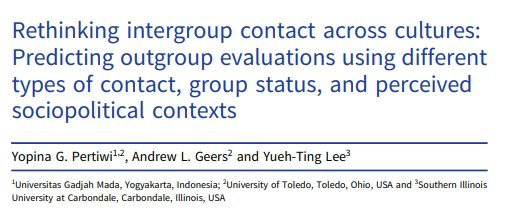
ABSTRACT. Two studies were conducted to examine the relationship between three different types of intergroup contact (i.e., direct contact, extended contact, and online contact) and outgroup evaluation, and the moderating effect of group status and sociopolitical contexts across two cultural contexts. A total of 75 European Americans (majority) and 44 Chinese Americans (minority) participated in Study 1; whereas 61 Javanese (majority) and 72 Chinese Indonesians (minority) participated in Study 2. In both studies, participants completed an outgroup feeling thermometer as well as a set of questionnaires measuring intergroup contact, perceived outgroup political power, perceived outgroup economic power, perceived government support, and perceived quality of the current intergroup relations. Results from the two studies revealed that although contact was beneficial in both cultural contexts, there were notable moderators of the links between contact and outgroup evaluations. Specifically, the value of direct contact was greater for the minority group members in the United States, extended contact only mattered in a specific condition when the perceived government support was taken into account in the United States, and online contact was beneficial across group status in the Indonesian context. Overall, the findings provide evidence of the need to take into account the role of specific sociopolitical relations between the two groups in intergroup relations research.
